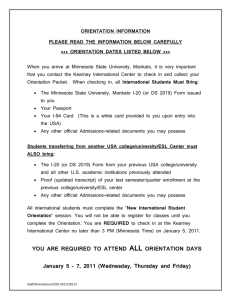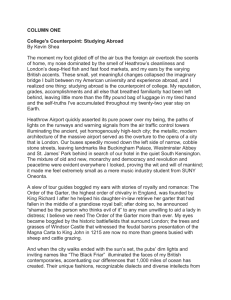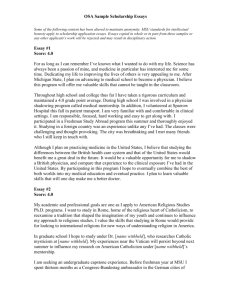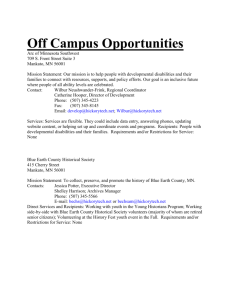Global Citizenship Essay
advertisement
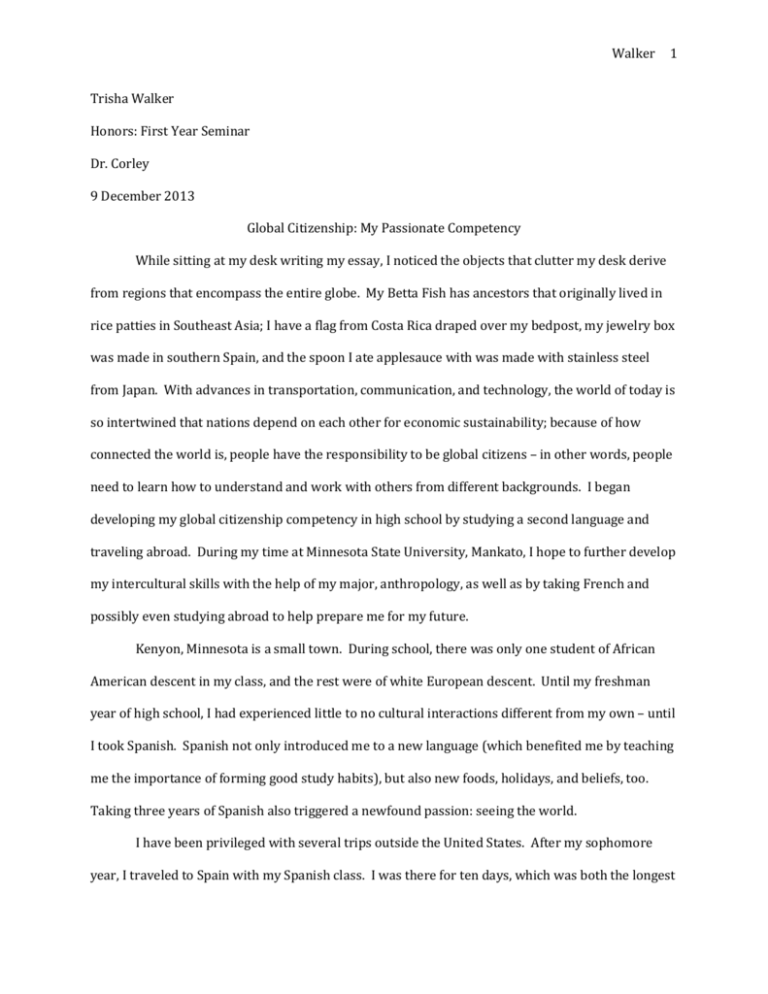
Walker 1 Trisha Walker Honors: First Year Seminar Dr. Corley 9 December 2013 Global Citizenship: My Passionate Competency While sitting at my desk writing my essay, I noticed the objects that clutter my desk derive from regions that encompass the entire globe. My Betta Fish has ancestors that originally lived in rice patties in Southeast Asia; I have a flag from Costa Rica draped over my bedpost, my jewelry box was made in southern Spain, and the spoon I ate applesauce with was made with stainless steel from Japan. With advances in transportation, communication, and technology, the world of today is so intertwined that nations depend on each other for economic sustainability; because of how connected the world is, people have the responsibility to be global citizens – in other words, people need to learn how to understand and work with others from different backgrounds. I began developing my global citizenship competency in high school by studying a second language and traveling abroad. During my time at Minnesota State University, Mankato, I hope to further develop my intercultural skills with the help of my major, anthropology, as well as by taking French and possibly even studying abroad to help prepare me for my future. Kenyon, Minnesota is a small town. During school, there was only one student of African American descent in my class, and the rest were of white European descent. Until my freshman year of high school, I had experienced little to no cultural interactions different from my own – until I took Spanish. Spanish not only introduced me to a new language (which benefited me by teaching me the importance of forming good study habits), but also new foods, holidays, and beliefs, too. Taking three years of Spanish also triggered a newfound passion: seeing the world. I have been privileged with several trips outside the United States. After my sophomore year, I traveled to Spain with my Spanish class. I was there for ten days, which was both the longest Walker 2 and farthest I had ever been away from home. Immediately upon getting off the plane, I had to start adapting to a new culture by trying to read all the Spanish signs and trying to communicate with natives in Spanish. Thankfully, my Spanish teacher and a tour guide helped ease the transition by guiding us around Madrid and the rest of the country. Towards the end of the trip, we took a day trip to northern Morocco; this was by far the most drastic culture change I had ever experienced at that point in my life, especially when touring the open markets in the closely packed streets. Traveling abroad helped me become more fluent; in Spain especially I was forced to speak in Spanish, and by the end of the trip I was able to put sentences together faster than I ever had been able to back home. Additionally, this past summer I went to Costa Rica with my environmental science class. During this excursion, I exclusively ate traditional Costa Rican dishes, which mostly included rice and beans at every meal. We also were able to directly interact with children in a rural school, where they talked with us, danced a traditional dance and let us play soccer with them. Being outside the United States has honestly been the most influential and valuable experience in my life. I really believe that my experiences outside of the country influenced my decision to major in anthropology at Minnesota State University, Mankato. I thoroughly enjoy learning about other cultures and experiencing a different way of life. During my fall 2013 semester, I am taking Anthropology 101. This is an introduction to the different types of anthropology in addition to a very important concept: the United States is not the basis for other cultures. Often times I feel that Americans spend a lot of time believing that their way of life is a model that other nations are trying to strive for, which is not always the case. I am looking forward to taking more culture-related classes as I progress through my major to help further my intercultural skills. This semester I made a transformative decision: I decided to switch my second language studies from Spanish to French. This decision was made based on my desire to work outside of the country in Europe and in Africa in the future. So far, French has developed my global citizenship Walker 3 competency similar to the way Spanish did – I am being introduced to new foods and traditions that are familiar to the French. Though I am only required to go through the 202 level of French, I am considering minoring, or maybe even double majoring, in French so as to learn as much about it as I can and to gain a fluency that could be important to my career in the future. Over the years, I have taken almost every chance offered to me to travel and experience new cultures. I cannot think of a more appropriate way to do this than studying abroad. In First Year Seminar, we discussed the opportunities offered on campus for studying abroad. Because I am studying French, there is a strong possibility that I will study abroad in France. I have the option of going for six weeks; two weeks would be spent touring Paris and Normandy, and the other four weeks would be spent taking French classes at a local French university. Since it would be my first time in France, I appreciate the fact that the program has “a staff member from Minnesota State University, Mankato, [who] accompanies the students and meets with them on a regular basis both in Paris, where he serves as guide, and in La Rochelle,” (Kearney International Center). If for some reason studying abroad does not work out for me, whether for financial or time management reasons, I also have an interest in teaching English as a second language at Mankato’s Lincoln center. I believe this would be an invaluable cultural experience, and I might also consider doing it even if I have the opportunity to study abroad. Minnesota State University, Mankato is full of opportunities to further my interactions with other cultures, whether it is learning a second language or studying and interacting with other cultures, all of which are preparing me for my future of interacting with an intertwined global society. For some time, I have been considering joining the Peace Corps after I graduate from college. To me, this would be one of the ultimate integrations into a different culture. Everything I would have done up to this point, from traveling abroad and experiencing other cultures to studying a second language and anthropology, would be training me for this. First Year Seminar Walker has really shown me where I am at with my global citizenship competency, which will be very beneficial to me as I prepare for my possible future in the Peace Corps and as an anthropologist. 4 Walker 5 Works Cited "Programs Kearney International Center." Programs Kearney International Center. Minnesota State University, Mankato, n.d. Web. 03 Dec. 2013.
